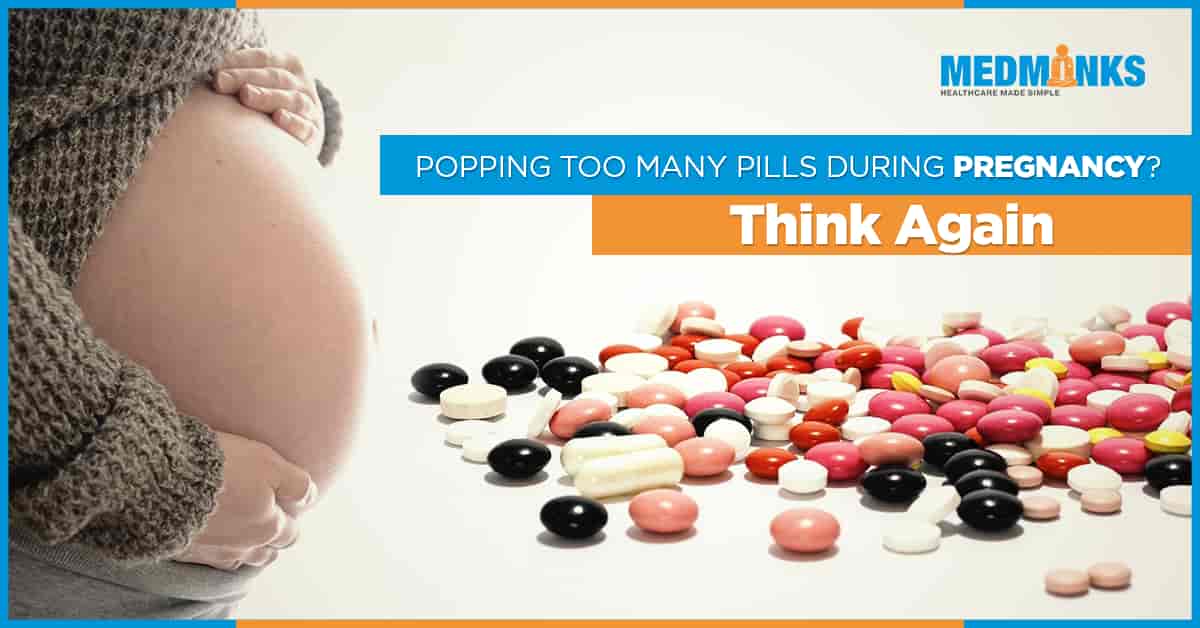Exposure to Over-the-counter (OTC) Drugs during Pregnancy may Hamper Fertility of Foetus, Says Study

Popping too many pills during pregnancy? Think Again
A recent study has potentially found parallels between the exposure of over-the-counter (OTC) drugs during pregnancy and risk of infertility in the foetus. This issue calls for exercising caution over the sale of such drugs and hence women themselves should be aware of the outcomes of using OTC drugs.
Shedding light on the complications arising from women’s exposure to paracetamol during pregnancy, the study has set off warning bells against the usage of such medicines as they have been linked with elevating the risk of impairing the fertility of female foetus.
Paracetamol, or acetaminophen, is an over-the-counter drug which helps in relieving pain and many women across the globe are exposed to such drugs. Paracetamol exposure during pregnancy has been associated with hampering the development of the male reproductive system, but the effects on the female foetus warrant extensive investigations.
Ingestion of OTC drugs during pregnancy significantly increases the likelihood of placental transfer. These drugs accumulate in the foetus and due to the inability of the foetus to handle these pharmaceutical agents, their immature renal function, and metabolic pathways are not fully developed hence drug exposure in the uterus may pose to be deleterious for the foetus.
For the study, researchers from Copenhagen University Hospital used rodent models. These pregnant mice were exposed to equivalent doses of paracetamol, similar to the intake of a pregnant woman to get relief from pain.
The findings of the study revealed that the baby rodents were born with fewer eggs, thereby escalating the risk of infertility. The study spotted an alteration in the reproductive systems of female offspring born to mothers, who were exposed to paracetamol during pregnancy. Also, it was found that women who were exposed to certain chemicals during pregnancy gave birth to babies who developed deformities later in life.
Dear Teens, Your Exposure to OTC Contraceptive Pills may permanently Make You Infertile
In addition to this, the study also has cited teenagers and adolescents exposure to oral contraceptives for averting unwanted pregnancies, thereby raising concern for taking necessary legal implications and reforming inter-disciplinary approach in addressing this issue.
As per reports of National Survey of Family Growth, 54 percent of the teenagers of age bracket 15 to 19 in the United States have already been exposed to such pills and follow up surveys have highlighted a drastic impact on fertility rates in the United States.
If we go by FDA laws and regulations, prescription drugs should only be considered routine OTC if they are safe for self-administration and therapeutic for a particular ailment, bearing labels that can be easily comprehended. Oral contraceptives have been associated with an adverse clinical result, which calls for counselling the teens about the aftermath of OTC’s and also provide them sexual and reproductive health care.
Oral contraceptives with the composition of a combination of oestrogen and progesterone, may also up the risk of blood clots, thereby increasing odds of stroke. However, the study warrants further research.
Your One Step towards Managing OTC Exposure Will Secure the Future of your Child
Pregnant women outweigh risks involved with over-the-counter and prescribed drugs and hence put their offspring infertility at stake. Exposure to OTC’s such as paracetamol, ibuprofen, cough and cold therapeutic remedies, morning sickness, antihistamines and nasal decongestants have been deemed to harm the baby.
Pregnant? Say no to these Medications
1. Thalidomide- This is a very frequently used medication for treating morning sickness and has been linked with causing severe limb defects in offspring.
2. Vitamin A derivatives- Exposure to supplements such as etretinate and isotretinoin increases odds of malformations of the heart, head, brain and spinal cord.
3. Anticancer drugs and immune-system-strengthening medications- Exposure to drugs for treating rheumatoid arthritis or inflammatory bowel diseases should be limited because such drugs have the potential to affect offspring’s immunity.
4. Other medications- Epilepsy drug phenytoin, the anticoagulant warfarin, valproate (which stabilises mood) and lithium (which is used for treating bipolar disorder), all of these are associated with causing birth defects.
However, if a woman has epilepsy, then it is better to take the prescribed drugs in a limited dose because untreated maternal disease increases odds of birth defects among children. One is advised to be under the care of their obstetrician or family physicians in all such cases.
Alcoholism and smoking always have negative outcomes and pregnant women who consume alcohol put their babies at risk of foetal alcohol syndrome, which is a condition characterised by deformity of the face and head and some babies have also exhibited cognitive and behavioural difficulties. Smoking is associated with threatened abortion and premature birth.
*Pregnant women take note; ignoring UTI and not seeking treatment for the same may pose to be fatal for the offspring*
Today our primary concern lies in preserving women and womanhood, and it is mandatory to dispense safety recommendations regarding pregnancy and to motivate them to manage various conditions efficiently. Understanding a woman’s concern is a significant step towards limiting their exposure to OTC’s and other medications. Multiple surveys revealed that many pregnant women sought advice from various online healthcare websites’ and portals and some also sought advice from pharmacists. However, a pharmacist should be well trained to give professional advice, especially to a pregnant woman.
This Mother’s Day, every pregnant woman who is complaining of pain should seek professional advice or consult with their general practitioner. Your one action towards tackling your general pain may avert birth defects in your child.





